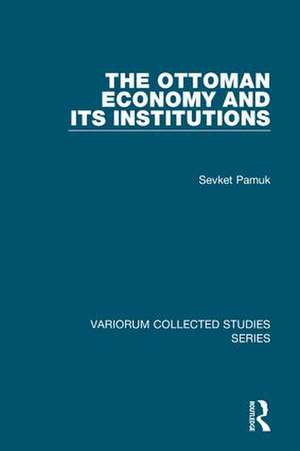The Ottoman Economy and Its Institutions: Variorum Collected Studies
Autor Sevket Pamuken Limba Engleză Hardback – mar 2009
Din seria Variorum Collected Studies
- 9%
 Preț: 938.85 lei
Preț: 938.85 lei -
 Preț: 311.41 lei
Preț: 311.41 lei -
 Preț: 351.48 lei
Preț: 351.48 lei -
 Preț: 313.38 lei
Preț: 313.38 lei -
 Preț: 386.77 lei
Preț: 386.77 lei -
 Preț: 325.68 lei
Preț: 325.68 lei -
 Preț: 396.00 lei
Preț: 396.00 lei -
 Preț: 312.75 lei
Preț: 312.75 lei - 9%
 Preț: 1041.23 lei
Preț: 1041.23 lei -
 Preț: 258.66 lei
Preț: 258.66 lei -
 Preț: 299.55 lei
Preț: 299.55 lei - 9%
 Preț: 938.08 lei
Preț: 938.08 lei -
 Preț: 343.33 lei
Preț: 343.33 lei -
 Preț: 311.18 lei
Preț: 311.18 lei - 9%
 Preț: 937.13 lei
Preț: 937.13 lei -
 Preț: 351.41 lei
Preț: 351.41 lei -
 Preț: 320.00 lei
Preț: 320.00 lei - 34%
 Preț: 764.20 lei
Preț: 764.20 lei - 23%
 Preț: 315.48 lei
Preț: 315.48 lei - 36%
 Preț: 740.06 lei
Preț: 740.06 lei - 34%
 Preț: 764.20 lei
Preț: 764.20 lei - 34%
 Preț: 680.73 lei
Preț: 680.73 lei - 26%
 Preț: 247.40 lei
Preț: 247.40 lei - 34%
 Preț: 485.78 lei
Preț: 485.78 lei - 38%
 Preț: 766.91 lei
Preț: 766.91 lei - 34%
 Preț: 767.07 lei
Preț: 767.07 lei - 34%
 Preț: 764.20 lei
Preț: 764.20 lei - 34%
 Preț: 769.51 lei
Preț: 769.51 lei - 38%
 Preț: 769.85 lei
Preț: 769.85 lei - 34%
 Preț: 826.68 lei
Preț: 826.68 lei - 25%
 Preț: 225.28 lei
Preț: 225.28 lei - 25%
 Preț: 225.54 lei
Preț: 225.54 lei - 34%
 Preț: 736.38 lei
Preț: 736.38 lei - 34%
 Preț: 738.43 lei
Preț: 738.43 lei - 25%
 Preț: 226.52 lei
Preț: 226.52 lei - 33%
 Preț: 491.66 lei
Preț: 491.66 lei - 34%
 Preț: 485.78 lei
Preț: 485.78 lei - 34%
 Preț: 485.78 lei
Preț: 485.78 lei - 36%
 Preț: 739.17 lei
Preț: 739.17 lei - 38%
 Preț: 766.34 lei
Preț: 766.34 lei - 31%
 Preț: 473.94 lei
Preț: 473.94 lei - 18%
 Preț: 843.61 lei
Preț: 843.61 lei - 38%
 Preț: 774.91 lei
Preț: 774.91 lei - 38%
 Preț: 769.92 lei
Preț: 769.92 lei - 34%
 Preț: 764.20 lei
Preț: 764.20 lei - 51%
 Preț: 485.78 lei
Preț: 485.78 lei - 36%
 Preț: 488.49 lei
Preț: 488.49 lei - 34%
 Preț: 769.10 lei
Preț: 769.10 lei - 38%
 Preț: 766.99 lei
Preț: 766.99 lei - 18%
 Preț: 1019.01 lei
Preț: 1019.01 lei
Preț: 329.76 lei
Preț vechi: 419.15 lei
-21% Nou
Puncte Express: 495
Preț estimativ în valută:
63.10€ • 66.06$ • 52.21£
63.10€ • 66.06$ • 52.21£
Comandă specială
Livrare economică 15-29 martie
Doresc să fiu notificat când acest titlu va fi disponibil:
Se trimite...
Preluare comenzi: 021 569.72.76
Specificații
ISBN-13: 9780754659815
ISBN-10: 075465981X
Pagini: 304
Dimensiuni: 150 x 224 mm
Greutate: 0.66 kg
Ediția:1
Editura: Taylor & Francis
Colecția Routledge
Seria Variorum Collected Studies
Locul publicării:Oxford, United Kingdom
ISBN-10: 075465981X
Pagini: 304
Dimensiuni: 150 x 224 mm
Greutate: 0.66 kg
Ediția:1
Editura: Taylor & Francis
Colecția Routledge
Seria Variorum Collected Studies
Locul publicării:Oxford, United Kingdom
Cuprins
Contents: Introduction; Institutional change and the longevity of the Ottoman Empire, 1500-1800; Ottoman interventionism in economic and monetary affairs; The Ottoman monetary system and frontier territories in Europe, 1500-1700; The evolution of financial institutions in the Ottoman Empire, 1600-1914; The price revolution in the Ottoman Empire reconsidered; Prices in the Ottoman Empire, 1469-1914; In the absence of domestic currency: debased European coinage in the 17th-century Ottoman Empire; The great Ottoman debasement, 1808-1844: a political economy framework; From debasement to external borrowing: changing forms of deficit finance in the Ottoman Empire, 1750-1914; The Middle East in 19th century world trade; Anatolia and Egypt during the 19th century: a comparison of foreign trade and foreign investment; The Ottoman Empire in the 'Great Depression' of 1873-1896; The Ottoman economy in World War I; Real wages and standards of living in the Ottoman Empire, 1489-1914; Estimating economic growth in the Middle East since 1820. Index.
Notă biografică
Sevket Pamuk is Professor of Economics and Economic History in the Ataturk Institute for Modern Turkish History and Department of Economics, Bogaziçi (Bosphorus) University, Turkey.
Recenzii
’The collection will be particularly welcome to historians of the Ottoman Empire - or at least those who are not themselves economic historians - as most of the articles originally appeared in journals outside their usual area of study and so will probably have escaped their notice.’ Journal of Islamic Studies
Descriere
The Ottoman Empire stood at a crossroads of intercontinental trade, stretching from the Balkans and the Black Sea region through the present day Middle East and most of the North African coast for six centuries up to World War I. The articles in this volume by a leading economic historian examine its economic institutions, the long term performance of the Ottoman economy and explore the reasons for the longevity of this large empire. They argue that the Ottoman state and society showed considerable ability to reorganize and adapt to changing circumstances and make the case that, until the 19th century, standards of living in many parts of the empire differed little from those in much of continental Europe.
